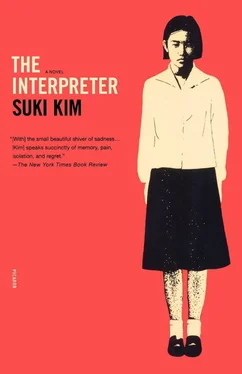Suki Kim - The Interpreter
Здесь есть возможность читать онлайн «Suki Kim - The Interpreter» весь текст электронной книги совершенно бесплатно (целиком полную версию без сокращений). В некоторых случаях можно слушать аудио, скачать через торрент в формате fb2 и присутствует краткое содержание. Город: New York, Год выпуска: 2011, ISBN: 2011, Издательство: Picador, Жанр: Детектив, Триллер, на английском языке. Описание произведения, (предисловие) а так же отзывы посетителей доступны на портале библиотеки ЛибКат.
- Название:The Interpreter
- Автор:
- Издательство:Picador
- Жанр:
- Год:2011
- Город:New York
- ISBN:0-312-42224-5
- Рейтинг книги:3 / 5. Голосов: 1
-
Избранное:Добавить в избранное
- Отзывы:
-
Ваша оценка:
- 60
- 1
- 2
- 3
- 4
- 5
The Interpreter: краткое содержание, описание и аннотация
Предлагаем к чтению аннотацию, описание, краткое содержание или предисловие (зависит от того, что написал сам автор книги «The Interpreter»). Если вы не нашли необходимую информацию о книге — напишите в комментариях, мы постараемся отыскать её.
The Interpreter — читать онлайн бесплатно полную книгу (весь текст) целиком
Ниже представлен текст книги, разбитый по страницам. Система сохранения места последней прочитанной страницы, позволяет с удобством читать онлайн бесплатно книгу «The Interpreter», без необходимости каждый раз заново искать на чём Вы остановились. Поставьте закладку, и сможете в любой момент перейти на страницу, на которой закончили чтение.
Интервал:
Закладка:
“How much?” Suzy asks, reaching for the glass of water on the table.
“How much what?”
“How much a month ago?”
“A hundred grand. In one shot.”
Something must have happened to Grace a month ago. Something changed. The guy. But he didn’t sound as if he were in need of money.
“She won’t sell the house, though. That, she won’t touch.”
“Which house?”
“Your parents’ house, of course.”
“Grace never sold it?”
“She won’t even charge rent. Maria Sutpen lucked out. I need a friend like your sister!”
Maria Sutpen. Suzy has never heard of that name before, but, then again, she knows virtually nothing about Grace’s life.
“Maria’s totally useless for an emergency contact. I called like a hundred times this week, but she’s never in. I got so frustrated that I almost went there myself. After all, the house is not too far from mine.”
“You live in Woodside too?”
“No, in Jackson Heights. But it’s just a couple of stops on the Number 7.”
Jackson Heights. Woodside. The Queens neighborhoods where the Korean population makes up nearly 50 percent, where a woman named Maria Sutpen has taken over her parents’ house.
“How long have you lived in Jackson Heights?”
“Since I was seven; why?” the young woman asks, glancing at the waitress who is heading over with a tray.
“No, nothing, it’s just I’ve lived there too…” Suzy mumbles, studying the lipstick smudge on the rim of her glass. She lets a few minutes pass before asking, “So why are you telling me all this?”
“’Cause I’m an only child, I guess.” The young woman shrugs. “I don’t get it when sisters don’t talk to each other. I think that’s like way twisted.”
“So you thought to run down here and warn me about Grace’s financial problems? So that I might track her down and convince her to keep Mr. Bae managing her money?” Suzy says quietly, meeting the other’s eyes.
“No!” the young woman exclaims, her face turning bright pink.
“It’s okay, nothing wrong with trying to help your father, or uncle, or whoever he might be for you. He seemed like he could use it,” Suzy says with a smile. “Honestly, though, I have no idea where she is. And you’re right, it’s really twisted that she won’t talk to me.”
The younger woman looks sullen, pretending to be having difficulty splitting apart her wooden chopsticks.
“Listen, if you don’t hear from her by Thanksgiving, call me,” says Suzy, writing down her phone number on the girl’s napkin.
Give it a few days, she thinks. If Grace turns up to sign the papers, then all must be fine. If she doesn’t, Suzy will be notified. That is, unless Suzy finds Grace first. Then, rising from her seat, Suzy asks, “And one more thing, what’s the name of that famous pool hall in Jackson Heights? Used to be a big deal in the eighties. Is it still around?”
The young woman looks up, befuddled. “You mean East Billiards on Roosevelt Avenue? Sure, they reopened a couple of years ago. Why? You play pool?”
16.
THERE IS NOTHING REMARKABLE about the brownstone at number 9. A two-story family home. The hexagonal living room protrudes with a fake-Victorian charm. Bright-pink lace hangs across each bay window. The only notable feature is the stoop. Seven steps in total, with newly painted railings. Shiny black layered with white stripes, like a zebra or a snake. It’s not a house but a zoo. A miniature animal-farm, right here in the heart of Queens.
It’s been half an hour. Late Friday afternoon. No one’s home. The adults are at work; the children have gone out to play. This must be the high time for robbery. Where are those Asian gangs? They raid their own people, Detective Lester said. But no gang in sight, hardly anyone on the block. It is not such a terrible neighborhood. Not a bad corner on which to spend your final night.
The sky is turning charcoal gray now. The threat of an imminent shower. She has no umbrella, and it is really not appropriate to get soaked on a stranger’s stoop. Her wait is numbered. It is good to have a limit. Otherwise, she might never walk away.
Across the street is a row of identical brownstones. She wonders if her parents knew any of the people there. Neighbors who saw them, who sat across the street while they ate, slept, worked. She wonders if any of them exchanged words on their final morning. Maybe someone’s car was parked in their driveway as her father was pulling out. Maybe a jogger waved at her mother walking out the front door. Maybe a newspaper delivery boy on a bicycle saw the light on in her parents’ bedroom and wondered who was getting up as early as he.
But no such evidence; it’s been five years. When they finally closed on the house, Suzy was long gone. Their first house in America. Their first home. The only evidence of home, although she’s never even seen it until now. From the outside, it appears no different from the countless apartments and brownstones in her childhood. A bit nicer, perhaps. A slightly better neighborhood. Woodside, not as bad as Jersey City or Jamaica. Never as bleak as the South Bronx, where her parents worked every day. Except the curtains are wrong. Mom would never have put up such pink frills across the window. Too happy. Too American. Maria Sutpen must be an all-American girl, one of the only whites on the block. A strange neighborhood for such a girl. A strange thing, to choose to be a minority. But, then again, a rent-free house does not come by every day. What does it mean that Grace just let her live here? What was their arrangement exactly? Has Grace always been so generous?
Grace never even let Suzy borrow her clothes when they were growing up. After all, they were only one year apart; it should have been natural for the sisters to share clothes. But Grace would not have it. She said that it creeped her out to see the same jacket, the same skirt on Suzy. Mom did not make it easier. She would often buy the same clothes for both girls. The same V-neck sweater in different colors, the same Jordache jeans in different sizes. Everything seemed to have been found on a two-for-one sale rack. It never occurred to Suzy to make a fuss. In fact, she could not understand why Grace was so bothered. Sure, they resembled each other, in that general way siblings do, but Grace was the one everyone remembered. On Grace, even the drabbest Woolworth’s finds turned into one-of-a-kind. It was like watching Cinderella at a touch of the wand, and Suzy would not have dared to try on her glass slippers. Yet it was Grace who marked her territory with vicious insistence. It was Grace who could not seem to bear the thought of being Suzy’s other half. It was always Grace who pushed her away first. So Suzy was completely taken aback when Grace left her most of her wardrobe upon leaving for Smith. When Suzy asked why, she shrugged and said, “Doesn’t matter anymore.” Not an act of generosity, Suzy thought. The exact opposite. A silent declaration of the end of sisterhood. What Grace wanted was to leave everything behind, including her own clothes, including Suzy in those same clothes. Suzy is still not sure what made her retort so sharply, “’Cause you’re never coming back.” Grace was in the middle of packing, the suitcase wide open on the floor. She stopped trying to fit the huge volume of the American Heritage Dictionary in between the set of writing pads and looked across at her with what Suzy thought was almost concern. The coldness was gone too. Finally, she said, as if in apology, “Not if I can help it.”
Grace had not spoken to the family for a few months by then. Not since the incident. No, not that Keller boy with whom she had once been found naked in the back of his father’s car. No, that had happened much earlier and was quickly forgotten once they moved away, soon after. Grace had come up with some story about having been forced by the boy, which Suzy suspected was a lie. The possibility that Grace might have been violated drew the matter to a taboo. It might even have secured Dad’s trust, for he no longer seemed to suspect Grace. No, the real thing happened when they were living in Jackson Heights. Suzy never learned what actually triggered such an outburst of violence, but one night, Dad dragged Grace in through the front door, gripping her by the hair. Grace’s hair reached down to her waist then; she often wore it in two long braids, like a mean version of Pocahontas, as some girls at school said. But that day, she must have worn it loose, because Suzy can still remember the black silk fluttering through the air as Dad took out the scissors and slashed through it. It had all happened so quickly that neither Suzy nor Mom could stop him. They simply backed against the wall and watched in horror. Grace did not even flinch. When she finally spoke, her voice carried such rage that Suzy felt suddenly afraid. Dad had begun shouting how she was ruining her life, to which Grace shot back, “But you’ve already made sure of that.” Strangely enough, Dad said nothing in return; Mom looked away. Grace turned to leave when she caught her own reflection in the mirror. Her face was all red from Dad’s burning hands. Her hair was cropped so close to her head, like a boy’s. For a second, Suzy thought she glimpsed a glint of smile on her sister’s face. It was a fleeting gesture. A flash of something akin to resignation. But a smile nonetheless.
Читать дальшеИнтервал:
Закладка:
Похожие книги на «The Interpreter»
Представляем Вашему вниманию похожие книги на «The Interpreter» списком для выбора. Мы отобрали схожую по названию и смыслу литературу в надежде предоставить читателям больше вариантов отыскать новые, интересные, ещё непрочитанные произведения.
Обсуждение, отзывы о книге «The Interpreter» и просто собственные мнения читателей. Оставьте ваши комментарии, напишите, что Вы думаете о произведении, его смысле или главных героях. Укажите что конкретно понравилось, а что нет, и почему Вы так считаете.












